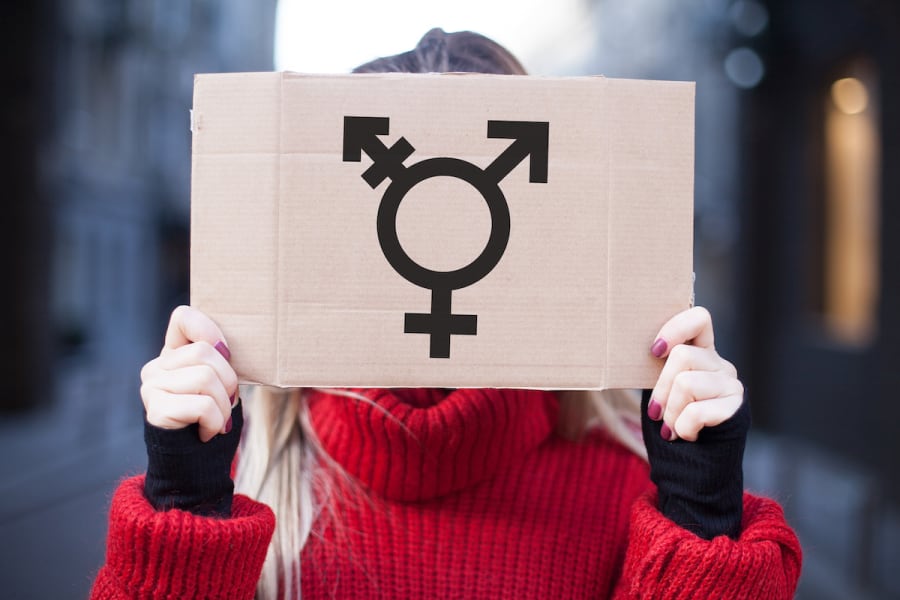Being forced to take a position on transgender issues

It was just recently that I came upon an article about a transgender Israeli who had been living abroad but, when returning to Israel, ran into a great deal of angst and confusion at Ben Gurion Airport, due to the inconsistency in preferred gender identification not matching was written in the individual’s passport.
In this case, the person identified as non-binary, meaning not being solely male or female. As the airport security guard did a double take a few times, the individual’s passport was taken in order to further discuss the perplexing situation with someone higher-up. Because the passport had a male name, and because the individual looked more male than female, there was approval to allow him entrance to Israel, but it was only on a one-time basis with the warning that it would not be permitted again.
We must admit that those of us who have not called gender identification into question, are now being asked to enter into a subject which obligates us to take a position one way or the other. From time immemorial, females have been females and males have been males. True, there were women who may have looked more masculine and vice versa, but they did not refute their gender or their given name, insisting that the two didn’t match. Yet today, we are being faced with a troubling and impossible situation for which few have an answer.
But from a practical point of view, most of us are left to wonder how to address such people – especially those where it’s visually impossible to differentiate gender. While in English, it’s less of a problem, if you want to address an Israeli shopkeeper in Hebrew, you must use a particular gender pronoun, but if you’re unsure as to which, there is a real problem.
In the case of security, similar to the airport situation mentioned above, gender is a defining characteristic, along with one’s given name and photo. If there is an inability to identify a person, because they are now contradicting what is written in their official documentation, that could easily result in a breach of security, putting others at risk.
This is reminiscent of a situation which occurred in the US. In 2003, one Florida judge refused to allow a Muslim woman to obtain a driver’s license without removing her veil for the identification photo, saying it would set a dangerous precedent that might be exploited by criminals or terrorists.
Similar incidents have occurred throughout the world – one being a Montreal judge who, in 2015, told a woman who appeared in her courtroom that she would not hear her case until she removed her hijab. In France, an official position has been taken that women wearing face coverings threaten the public’s safety. Consequently, “In 2010, the country brought in a complete ban on clothing that includes full-face coverings - including the burka and niqab. These cannot be worn in any public space in France, at risk of a €150 fine.”
All of these disturbing and confusing issues, with which we are now being confronted, on a daily basis, as we’re being dragged into what’s being stated as a “new reality,” is forcing us to take a position on how we relate to the question of transgenderism. This gender dysphoria is a condition defined by psychiatrists in the DSM-5 (Fifth Edition of Diagnostic and Statistical Manual of Mental Disorders), although it’s likely that it will no longer be defined that way due to societal pressure.
However, it doesn’t change the fact that a growing number of individuals, who claim to experience an incongruence between their birth gender and how they personally feel, are expecting all of us to accommodate those feelings by accepting their preferred gender, even if they choose to physically remain as they are. The same is true of individuals who prefer not to be identified by any gender at all.
While some readers may not have ever experienced being confronted by this transgender or non-binary phenomenon, the ever-growing numbers suggest that they will be, and probably sooner than they think.
At that point, each person will have to make a decision as to whether to run the risk of offending the individual by using the wrong pronouns or by their double-take simply because they don’t know how to process what they’ve seen. The other choice is to go for the accommodation, because that’s what is expected of us these days.
We are supposed to show a sensitivity to transgenders since they already feel “misunderstood and rejected.” But wasn’t that identity their choice? So, why must someone who doesn’t see it the same way, be forced to change their point of view and adopt someone else’s new philosophy or proclivity? Why are our sensibilities no longer valid or fixed positions?
In fact, for those unwilling to accommodate this new trend, they run the risk of being labeled a transphobe, a bigot or some other name which identifies them as being intolerant and narrow-minded. In the end, someone else’s issue ends up being our problem. Accept what they now feel or you become the intolerable individual who must be cast aside for being unwilling to bend.
Those who struggle with gender difficulties may not see it that way, but the bullying, which they claim to fear, ends up being transposed onto people who do not want to champion their choice. Progressive society is doing its best to compel everyone to take a favorable and supportive position on changing one’s gender, as well as the total rejection of gender.
By doing so, they are compelling people to discard personal opinions and expressions of how they truly feel about this issue. It is nothing more than lock-step thought, where everyone falls into line for fear of being rejected and persecuted. In fact, it’s a pretty clever way to turn the tables on well-adjusted people, who do not suffer from a strong sense that they were created in a faulty way.
While it’s tempting to comply and not be a stand-out, there is a cost to pay. The price is turning off one’s conscience and sense of values and morals. But once you do, you have outsourced your behavior to others whose fear tactics have worked, causing us to no longer be the masters of our own feelings and thoughts. It’s, frankly, a scary place to end up, because it is a robotic existence.
It might be good, however, to take a quick glance at how it all started. The biblical book of Genesis, records that God created us male and female. In the end, deferring to the Creator may be the best position of all when it comes to the issue of gender, because who knows better than Him?

A former Jerusalem elementary and middle-school principal who made Aliyah in 1993 and became a member of Kibbutz Reim but now lives in the center of the country with her husband. She is the author of Mistake-Proof Parenting, based on the principles from the book of Proverbs - available on Amazon.













